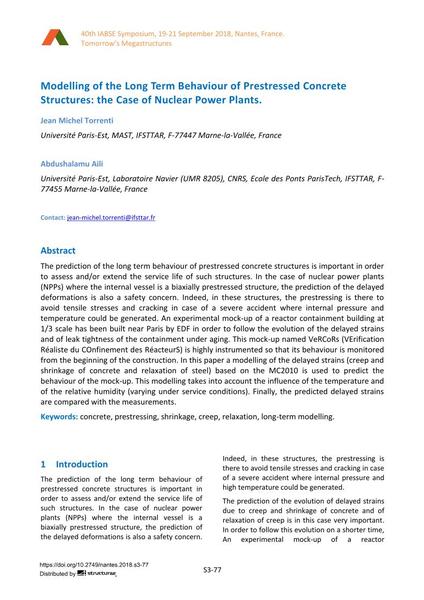Modelling of the Long Term Behaviour of Prestressed Concrete Structures: the Case of Nuclear Power Plants.

|
|
|||||||||||
Bibliografische Angaben
| Autor(en): |
Jean Michel Torrenti
(Université Paris-Est, MAST, IFSTTAR, F-77447 Marne-la-Vallée, France)
Abdushalamu Aili (Université Paris-Est, Laboratoire Navier (UMR 8205), CNRS, Ecole des Ponts ParisTech, IFSTTAR, F- 77455 Marne-la-Vallée, France) |
||||
|---|---|---|---|---|---|
| Medium: | Tagungsbeitrag | ||||
| Sprache(n): | Englisch | ||||
| Tagung: | IABSE Symposium: Tomorrow’s Megastructures, Nantes, France, 19-21 September 2018 | ||||
| Veröffentlicht in: | IABSE Symposium Nantes 2018 | ||||
|
|||||
| Seite(n): | S3-77 | ||||
| Anzahl der Seiten (im PDF): | 8 | ||||
| DOI: | 10.2749/nantes.2018.s3-77 | ||||
| Abstrakt: |
The prediction of the long term behaviour of prestressed concrete structures is important in order to assess and/or extend the service life of such structures. In the case of nuclear power plants (NPPs) where the internal vessel is a biaxially prestressed structure, the prediction of the delayed deformations is also a safety concern. Indeed, in these structures, the prestressing is there to avoid tensile stresses and cracking in case of a severe accident where internal pressure and temperature could be generated. An experimental mock-up of a reactor containment building at 1/3 scale has been built near Paris by EDF in order to follow the evolution of the delayed strains and of leak tightness of the containment under aging. This mock-up named VeRCoRs (VErification Réaliste du COnfinement des RéacteurS) is highly instrumented so that its behaviour is monitored from the beginning of the construction. In this paper a modelling of the delayed strains (creep and shrinkage of concrete and relaxation of steel) based on the MC2010 is used to predict the behaviour of the mock-up. This modelling takes into account the influence of the temperature and of the relative humidity (varying under service conditions). Finally, the predicted delayed strains are compared with the measurements. |
||||
| Stichwörter: |
Beton Vorspannung Schwinden
|
||||

